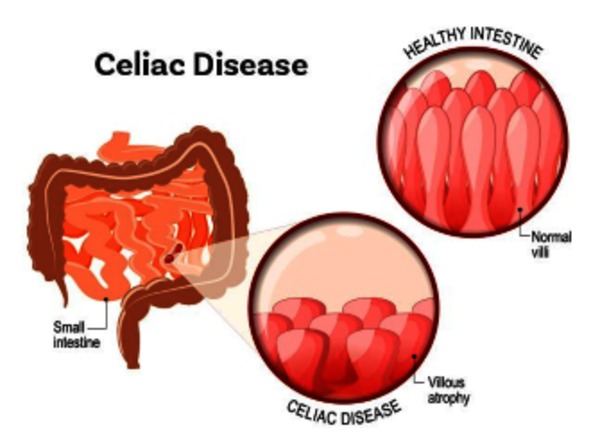
Celiac disease is a serious autoimmune disorder that can occur in genetically predisposed people where the ingestion of gluten leads to damage in the small intestine. It affects about 1 in 100 people worldwide and can develop at any age after people start eating foods or medicines that contain gluten. The symptoms of celiac disease can vary widely, making it important to be aware of the potential signs of the condition. In this article, we’ll explore some of the common symptoms of celiac disease.
1. Digestive Issues
One of the most common symptoms of celiac disease is digestive problems. These can include diarrhea, constipation, abdominal pain, bloating, and gas. The damage to the small intestine caused by the consumption of gluten can lead to malabsorption of nutrients, resulting in these digestive symptoms.
Some people with celiac disease may also experience nausea and vomiting as a result of the condition. If you are experiencing persistent digestive issues, it is important to consult with a healthcare professional to rule out celiac disease as a potential cause.
2. Fatigue
Fatigue is another common symptom of celiac disease. People with the condition may feel constantly tired and lacking in energy, even after getting enough rest. This fatigue can be debilitating and significantly impact a person’s quality of life.
It is important to note that fatigue can be a symptom of many different conditions, so it is essential to seek a proper diagnosis from a healthcare professional if you are experiencing persistent fatigue.
3. Weight Loss
Unintended weight loss can be a sign of celiac disease. The malabsorption of nutrients due to damage in the small intestine can lead to a decrease in weight, even if a person is consuming a normal amount of food. If you are experiencing unexplained weight loss, it is important to consider the possibility of celiac disease as a potential cause.
It is important to note that not everyone with celiac disease will experience weight loss. Some people with the condition may actually gain weight due to an increased appetite as a result of the body’s inability to absorb nutrients properly.
4. Anemia
Anemia, or a low red blood cell count, can be a symptom of celiac disease. The malabsorption of iron and other nutrients in the small intestine can lead to anemia in people with the condition. Symptoms of anemia can include fatigue, weakness, and shortness of breath.
If you are experiencing symptoms of anemia, it is important to consult with a healthcare professional to determine the underlying cause and receive appropriate treatment.
5. Skin Rash
Some people with celiac disease may develop a itchy, blistering skin rash known as dermatitis herpetiformis. This rash is often symmetrical and commonly appears on the elbows, knees, buttocks, and scalp.
If you are experiencing a persistent skin rash, it is important to consult with a dermatologist who can help determine the cause and provide appropriate treatment.
6. Joint Pain
Joint pain and inflammation can be a symptom of celiac disease. People with the condition may experience pain and swelling in their joints, particularly in the knees, hips, and hands. This joint pain can significantly impact a person’s mobility and quality of life.
If you are experiencing persistent joint pain, it is important to seek a proper diagnosis from a healthcare professional in order to receive appropriate treatment.
7. Headaches
Frequent headaches can be a symptom of celiac disease. Some people with the condition may experience migraines or tension headaches on a regular basis. It is important to note that headaches can be a symptom of many different conditions, so it is important to consult with a healthcare professional to determine the underlying cause.
If you are experiencing persistent headaches, it is important to seek a proper diagnosis and treatment from a healthcare professional.
8. Depression and Anxiety
People with celiac disease may be at an increased risk for depression and anxiety. The link between celiac disease and mental health conditions is not entirely understood, but it is believed to be related to the impact of the condition on overall well-being and quality of life.
If you are experiencing symptoms of depression or anxiety, it is important to seek support from a mental health professional who can provide appropriate treatment.
9. Infertility and Miscarriage
Women with untreated celiac disease may have difficulty conceiving and an increased risk of miscarriage. The malabsorption of nutrients due to damage in the small intestine can impact reproductive health and fertility in women with the condition.
If you are experiencing infertility or have had recurrent miscarriages, it is important to consult with a healthcare professional who can help determine the underlying cause and provide appropriate support and treatment.
10. Numbness and Tingling
Numbness and tingling in the hands and feet can be a symptom of celiac disease. This sensation, known as peripheral neuropathy, is caused by nerve damage as a result of the condition. It is important to seek a proper diagnosis from a healthcare professional if you are experiencing persistent numbness and tingling.
Overall, celiac disease can present with a wide range of symptoms that can vary from person to person. If you are experiencing any of the symptoms mentioned in this article, it is important to consult with a healthcare professional to receive a proper diagnosis and appropriate treatment.












